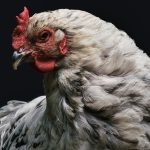Proper housing for chickens in winter is essential for their health and well-being. As temperatures drop, chickens become more vulnerable to cold-related health issues such as frostbite and respiratory problems. A warm, dry shelter is necessary to protect them from harsh winter conditions.
A well-insulated coop with adequate ventilation is crucial for maintaining chicken health during colder months. Without proper shelter, chickens may experience stress, decreased egg production, and potentially death due to extreme cold. A well-designed coop also helps prevent drafts and moisture buildup, which can lead to respiratory issues and frostbite.
Insulating the coop’s walls and ceiling helps retain heat and prevent cold air infiltration. Sealing gaps and cracks prevents drafts that can significantly lower interior temperatures. Proper ventilation is crucial for removing excess moisture while allowing fresh air circulation, creating a healthier environment for chickens.
In addition to insulation and ventilation, providing adequate bedding such as straw or wood shavings helps keep chickens warm and dry. The bedding acts as insulation, creating a barrier between the chickens and the cold coop floor. These measures are essential for maintaining chicken health and comfort throughout the winter season.
Table of Contents
- 1 Tips for Keeping Chickens Warm and Healthy in Cold Weather
- 2 Providing Adequate Nutrition for Chickens During the Winter Months
- 3 Protecting Chickens from Frostbite and Other Cold-Related Health Issues
- 4 Maintaining Clean and Dry Coops and Runs in Winter
- 5 Strategies for Managing Chicken Behavior and Egg Production in Winter
- 6 Preparing for Spring: Getting Chickens Ready for the Transition to Warmer Weather
- 7 FAQs
- 7.1 What are some important considerations for keeping chickens in winter?
- 7.2 How can I keep my chicken coop warm in winter?
- 7.3 What should I feed my chickens in winter?
- 7.4 How can I prevent my chickens’ water from freezing in winter?
- 7.5 What are some common health issues for chickens in winter?
Key Takeaways
- Proper housing for chickens in winter is crucial for their health and well-being
- Tips for keeping chickens warm and healthy in cold weather include insulating the coop and providing a heat source
- Providing adequate nutrition for chickens during the winter months is essential for their overall health and egg production
- Protecting chickens from frostbite and other cold-related health issues requires regular checks and proper care
- Maintaining clean and dry coops and runs in winter is important to prevent health issues and maintain a comfortable environment for the chickens
Tips for Keeping Chickens Warm and Healthy in Cold Weather
Providing Supplemental Heat and Insulation
One important tip for keeping chickens warm and healthy during the cold winter months is to provide supplemental heat in the coop, especially during extremely cold temperatures. This can be achieved using a heat lamp or a heated panel to raise the temperature inside the coop. It is important to place the heat source in a safe location to prevent any fire hazards or injuries to the chickens. Additionally, providing extra insulation in the form of blankets or tarps can help to retain heat and keep the coop warm.
Ensuring Access to Unfrozen Water and Nutritious Food
Hydration is crucial for chickens’ health, so it is important to make sure they have access to unfrozen water at all times. This can be achieved by using heated waterers or regularly checking and replacing frozen water. Furthermore, providing extra food during the winter months can help chickens maintain their body temperature and energy levels. High-energy foods such as cracked corn or sunflower seeds can provide an extra boost during cold weather.
Monitoring Health and Providing Opportunities for Exercise and Sunlight
In addition to providing supplemental heat and insulation, it is important to monitor the chickens’ behavior and health during the winter months. Regularly checking on the chickens for signs of distress or illness is crucial for their well-being. Signs of distress may include huddling together for warmth, decreased activity, or lethargy. It is important to address any issues promptly to prevent further health problems. Additionally, providing opportunities for exercise and sunlight can help to keep chickens healthy during the winter months. Allowing them access to a protected outdoor area on sunny days can provide them with much-needed exercise and exposure to natural light.
Maintaining a Clean and Healthy Environment
Furthermore, maintaining a clean and dry coop is essential for preventing respiratory issues and frostbite. Regularly cleaning out soiled bedding and ensuring proper ventilation can help to create a healthier environment for the chickens. By following these tips, you can help to keep your chickens warm, healthy, and comfortable during the winter season.
Providing Adequate Nutrition for Chickens During the Winter Months

Providing adequate nutrition for chickens during the winter months is essential for their health and well-being. As the temperatures drop, chickens require more energy to maintain their body temperature, so it is important to adjust their diet accordingly. One way to do this is by providing high-energy foods such as cracked corn, sunflower seeds, or mealworms.
These foods can help to provide extra calories and nutrients to keep chickens warm and healthy during the colder months. Additionally, increasing their protein intake can help to support their immune system and maintain muscle mass. This can be achieved by supplementing their diet with protein-rich foods such as soybeans or fish meal.
It is also important to ensure that chickens have access to fresh greens and vegetables, as these can provide essential vitamins and minerals that may be lacking in their diet during the winter months. Overall, providing a well-balanced diet is crucial for keeping chickens healthy and thriving throughout the winter season. In addition to adjusting their diet, it is important to ensure that chickens have access to clean and unfrozen water at all times.
Hydration is crucial for their health, especially during the winter months when water sources are more likely to freeze. Using heated waterers or regularly checking and replacing frozen water can help to ensure that chickens have access to fresh water throughout the day. Furthermore, providing access to grit and oyster shells can help to support their digestive health and egg production during the winter months.
Grit aids in digestion by helping chickens break down food in their gizzards, while oyster shells provide essential calcium for strong eggshells. Overall, providing adequate nutrition is essential for keeping chickens healthy and thriving during the winter season.
Protecting chickens from frostbite and other cold-related health issues is crucial for their well-being during the winter months. Frostbite occurs when the skin and tissues freeze due to prolonged exposure to cold temperatures, particularly on combs, wattles, and feet. To prevent frostbite, it is important to provide adequate shelter with good insulation and ventilation to keep the coop warm and dry.
Additionally, applying petroleum jelly or other protective ointments on exposed areas such as combs and wattles can help to prevent frostbite by creating a barrier against the cold. It is also important to monitor chickens for signs of frostbite, such as discoloration or swelling of their extremities, and address any issues promptly. Furthermore, providing extra bedding such as straw or wood shavings can help to insulate the coop floor and keep chickens warm and dry, reducing the risk of frostbite.
Overall, protecting chickens from frostbite and other cold-related health issues is essential for their well-being during the winter season. In addition to frostbite, chickens are also susceptible to respiratory issues during the winter months due to poor ventilation and moisture buildup in the coop. To prevent respiratory problems, it is important to ensure that the coop has good ventilation to allow fresh air to circulate while removing excess moisture.
This can be achieved by installing vents or windows that can be opened and closed as needed. Additionally, regularly cleaning out soiled bedding and ensuring that the coop remains dry can help to prevent respiratory issues by reducing moisture buildup. It is also important to monitor chickens for signs of respiratory distress, such as coughing or wheezing, and address any issues promptly.
Furthermore, providing supplemental heat in the coop can help to maintain a comfortable temperature and reduce the risk of respiratory problems. Overall, protecting chickens from frostbite and respiratory issues is essential for their health and well-being during the winter season.
Maintaining Clean and Dry Coops and Runs in Winter
Maintaining clean and dry coops and runs in winter is essential for keeping chickens healthy and comfortable during the colder months. A clean environment helps to prevent respiratory issues, frostbite, and other health problems that can arise from moisture buildup and poor ventilation. Regularly cleaning out soiled bedding from the coop floor helps to reduce ammonia levels and moisture buildup, creating a healthier environment for the chickens.
Additionally, ensuring that the coop remains dry by fixing any leaks or drainage issues can help to prevent mold growth and respiratory problems. Providing proper ventilation in the coop also helps to remove excess moisture while allowing fresh air to circulate, creating a healthier environment for the chickens. Overall, maintaining clean and dry coops and runs is crucial for preventing health issues and keeping chickens comfortable during the winter season.
In addition to maintaining a clean coop, it is important to also keep the chicken run clean and dry during the winter months. This can be achieved by regularly raking or removing soiled bedding from the run area to prevent moisture buildup and odor. Providing a dry surface in the run area helps to prevent mud and puddles from forming, which can lead to bacterial growth and foot problems for the chickens.
Additionally, providing a covered area in the run can help to protect chickens from rain or snow while allowing them access to fresh air and exercise. It is also important to regularly inspect the run area for any potential hazards such as sharp objects or toxic plants that could harm the chickens. Overall, maintaining clean and dry coops and runs is essential for creating a healthy environment for chickens during the winter season.
Strategies for Managing Chicken Behavior and Egg Production in Winter

Providing Opportunities for Exercise and Natural Light
To manage chicken behavior in winter, it’s essential to provide them with opportunities for exercise and exposure to natural light on sunny days. Allowing access to a protected outdoor area can provide much-needed exercise while helping regulate their internal clock. Additionally, providing enrichment activities such as hanging treats or toys in the coop can keep them active during colder days when outdoor access may be limited.
Managing chicken behavior also involves monitoring their social dynamics within the flock, as they may spend more time indoors due to colder weather, leading to increased stress levels or aggression among flock members. In terms of egg production, adjusting their diet accordingly is crucial. Providing high-energy foods such as cracked corn or sunflower seeds can help maintain their body temperature while supporting egg production during colder months when they require more energy.
Supplemental Lighting and Rest
Providing supplemental light in the coop can help stimulate egg production by extending daylight hours, encouraging hens to lay eggs even during shorter winter days. However, it’s essential not to overdo it with artificial lighting, as it may cause stress on hens if they are not allowed enough time for rest at night, negatively impacting their overall health.
Preparing for Spring: Getting Chickens Ready for the Transition to Warmer Weather
As winter comes to an end, it’s important to start preparing chickens for the transition into warmer weather in springtime. One way of doing this is by gradually increasing their outdoor time as temperatures begin to rise allowing them more time outside where they can enjoy fresh air while engaging in natural behaviors such as dust bathing or foraging which may have been limited during colder months when outdoor access was restricted due to harsh weather conditions. Another aspect of preparing chickens for spring involves gradually transitioning them back onto a regular diet that includes more fresh greens as they become available with warmer weather which will provide them with essential vitamins and minerals that may have been lacking during winter months when fresh vegetation was scarce.
Additionally, it’s important to start preparing outdoor areas such as chicken runs by removing any debris or soiled bedding that may have accumulated over winter months while ensuring that there are no potential hazards such as sharp objects or toxic plants that could harm chickens once they start spending more time outside. Furthermore, it’s important to monitor chicken behavior closely as they transition into springtime as they may experience changes in social dynamics within their flock due increased outdoor time which could lead increased stress levels or aggression among flock members. Overall preparing chickens for spring involves gradually increasing outdoor time while transitioning them back onto regular diet with more fresh greens available while ensuring that outdoor areas are safe while monitoring chicken behavior closely as they adjust into warmer weather conditions.
If you’re looking for tips on how to keep chickens in winter, you might want to check out this article on renting a chicken coop. It can provide valuable information on how to provide a warm and safe environment for your chickens during the colder months.
FAQs
What are some important considerations for keeping chickens in winter?
Some important considerations for keeping chickens in winter include providing adequate shelter, ensuring access to fresh water that doesn’t freeze, and providing a balanced diet to help them stay warm.
How can I keep my chicken coop warm in winter?
You can keep your chicken coop warm in winter by insulating the walls and roof, using a heat lamp or heated waterer, and providing plenty of bedding for the chickens to nest in.
What should I feed my chickens in winter?
In winter, it’s important to feed your chickens a balanced diet that includes plenty of protein and carbohydrates to help them stay warm. You can also supplement their diet with scratch grains and kitchen scraps.
How can I prevent my chickens’ water from freezing in winter?
To prevent your chickens’ water from freezing in winter, you can use a heated waterer, place a heated rock in the water, or use a water heater designed for poultry.
What are some common health issues for chickens in winter?
Some common health issues for chickens in winter include frostbite, respiratory infections, and decreased egg production. It’s important to monitor your chickens closely and provide appropriate care to prevent these issues.
Meet Walter, the feathered-friend fanatic of Florida! Nestled in the sunshine state, Walter struts through life with his feathered companions, clucking his way to happiness. With a coop that’s fancier than a five-star hotel, he’s the Don Juan of the chicken world. When he’s not teaching his hens to do the cha-cha, you’ll find him in a heated debate with his prized rooster, Sir Clucks-a-Lot. Walter’s poultry passion is no yolk; he’s the sunny-side-up guy you never knew you needed in your flock of friends!







